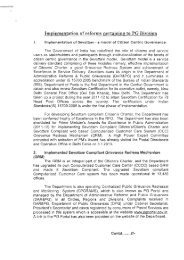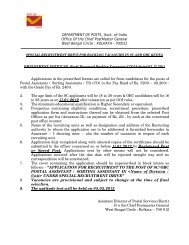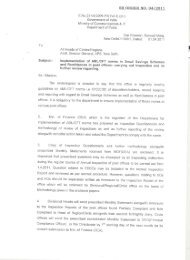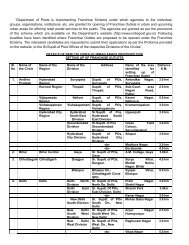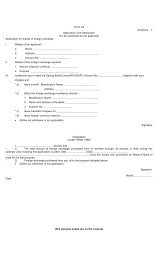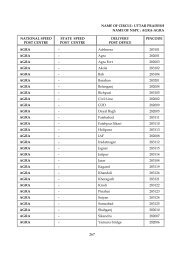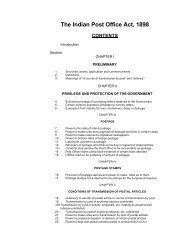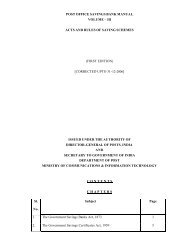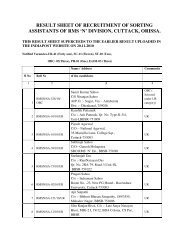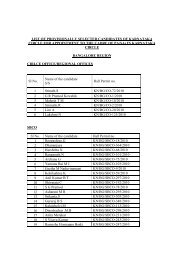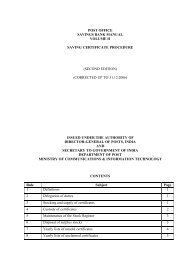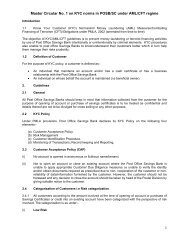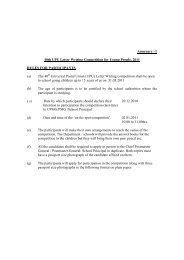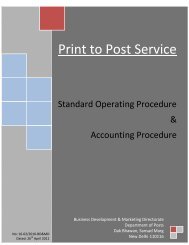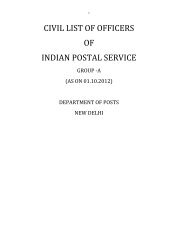Post office guide part i - India Post
Post office guide part i - India Post
Post office guide part i - India Post
Create successful ePaper yourself
Turn your PDF publications into a flip-book with our unique Google optimized e-Paper software.
following the expiry of the said period of seven days. The commission will in no case be<br />
refunded.<br />
230. Void Money Orders. – If payment of a money order to the payee cannot be effected<br />
and the amount cannot be repaid to the remitter owing to the latter not being found, the order will<br />
become void and its value be credited to the Central Government. But if the payee or remitter<br />
subsequently applies for payment, the amount of the order will be paid to him on the authority of<br />
the <strong>Post</strong>al Accounts Officer provided that application is made before the expiration of one year<br />
from the date of issue of the original order :<br />
Provided that the amount of a money order other than a V.P. money order shall be repaid to<br />
the remitter in case the payee is dead:<br />
Provided further that where the remitter or, in case of a V.P. money order the payee, is<br />
dead, the amount of the money order or money orders upto one hundred rupees shall be paid to the<br />
claimant on his executing a personal indemnity bond; and for amounts exceeding one hundred<br />
rupees, an indemnity bond with one surety shall be obtained from the claimant.<br />
Exception:<br />
NOTE 1:-<br />
NOTE 2:-<br />
In the case of money orders issued from field post <strong>office</strong> and family allotment MOs<br />
remitted on behalf of seamers working on <strong>India</strong>n merchant ships, the limit of time for<br />
making such an application shall be two years.<br />
When payment of a void order is to be made in a country or at a place outside <strong>India</strong> with<br />
which money orders can be exchanged, a fresh commission is deducted from the amount of<br />
the order at the rates applicable to Inland money order expressed in sterling according as<br />
the settlement country or place where payment is to be made is on which money orders are<br />
drawn in rupee currency or in sterling currency.<br />
In the case of a money order is in excess of the limit prescribed for remittance to foreign<br />
country under any law or regulation in force at the time of such redirection, the remitter or<br />
the payee should obtain payment of the amount of the money order in <strong>India</strong> either<br />
personally or through a duly authorized agent or furnish the authority of the Reserve Bank<br />
of <strong>India</strong> permitting the remittance of the amount of the money order out of <strong>India</strong> by means<br />
of foreign money order.<br />
231. Special Money Order Forms. – Certain special types of Money Order Forms have<br />
been prescribed for remitting Government dues and some of them are current only within the<br />
limits of the State for which they are issued. These forms can be obtained from the <strong>Post</strong> Offices<br />
concerned.<br />
232. Option of <strong>Post</strong> Office. – The Director General may, at any time, suspend the issue of<br />
money orders upon or by any <strong>part</strong>icular post <strong>office</strong>, or group of post <strong>office</strong>s or direct that money<br />
orders should not be issued except on payment of special rates of commission higher than the<br />
ordinary rates.<br />
233. Transmission of Money Orders. – All money orders are carried by air like letters<br />
and postcards without any surcharge wherever such a conveyance is available and is advantageous.



